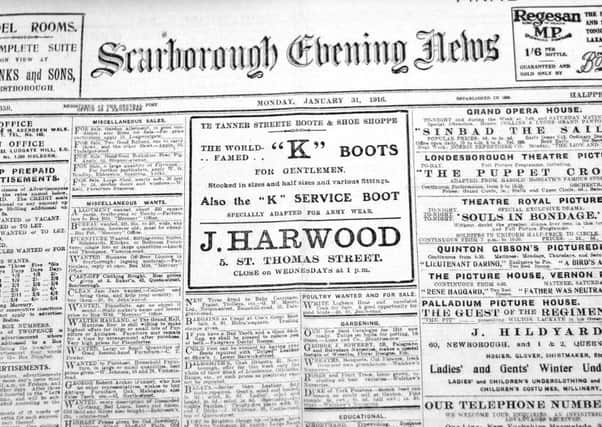1916 court: Retired Rangoon police officer deserts family


The defendant, at the outset, said his name was Ernest Prince Fuggle, and that he did not admit desertion.
Mr J Whitfield, solicitor, who appeared for the complainant, said the latter was now residing at 2 Norwood Street, Scarborough, with her son-in-law and her daughter, and it appeared that the complainant and defendant were married at the Cathedral, Rangoon, on 30 April, 1898. The defendant at that time was in the Rangoon Police Force, and on 27 February, 1914, the defendant returned to England on sick leave. He was supposed to return to India after the expiration of six months, and in the meantime he left his wife in India. He did not return in six months because he received certain extensions of his leave on medical certificates, and it appeared indeed that he did not return at all - he was allowed to retire on a pension which he, Mr Whitfield, understood amounted to about £1 per week. From the time of the defendant leaving India his wife heard nothing from him. He (Mr Whitfield) understood she received no maintenance from him but about 18 months later she received a letter from her husband stating that he had on certain occasions misunderstood himself with a certain woman, whose name he gave in India, and his suggestion was that his wife should obtain a divorce from him. This was the only communication his client had received from him. Ultimately, the complainant came over to England, arriving here on 20 June of the present year, along with her daughter and her son-in-law. The son-in-law was also in the Rangoon Police as a head inspector, and he was also superior of the defendant. On August 7, the son-in-law, whose name was Charles Edward Brown, accompanied his wife to Tenterton, in Kent, where they understood the defendant was residing, and he there had an interview with him.
Advertisement
Hide AdAdvertisement
Hide AdAt this stage Mr Whitfield was handed the letter - the only one - which the defendant wrote to his wife and step-daughter in Rangoon from England. Mr Whitfield read out the letter which was to this effect:
“My dears, I have to reveal a long secret to you both. My life during the past five years in Rangoon has been nothing more than living in adultery and the person to blame is Mrs _, your greatest friend. I reveal this so that you can forget me. You are free to live with anyone else you wish, and I am not returning to Burmah even if I get well enough...I know you were always true to me, and I have no more to say and I wish you all health and prosperity. You may place the matter in the lawyer’s hands and get a divorce...God bless you all in far off lands.”
Proceeding, Mr Whitfield said Mr Brown and his wife visited Tenterton to make enquiries about the defendant. They called at the house where the defendant was living and Mrs Brown said to the defendant, “What are you going to do about the matter?” The defendant said, “Well, she has got my letter. She can go and get a divorce.” Mrs Brown replied, “You have got a woman here. You had one prostitute in Bombay, and now you have another. I believe you are married.” The defendant did not deny the suggestion of marriage to the woman at Tenterton, said Mr Whitfield. At the interview, before the summons was taken out against him, the defendant made no suggestion of his wife returning to him or that he would offer her a home or maintenance. No, he considered her remedy was to get a divorce. It was not for him (the defendant) to say that the case should be dismissed merely on his suggestion that he would “turn the other woman out”. It was not consistent with what he said in June last. The only point their Worships had to consider was: Was there desertion on the day on which the summons was taken out? If there was desertion then it was quite sufficient. It was the only thing they had to prove.
It was stated, in evidence, that when the defendant married the complainant he went by the name of John Alfred Wood.
Advertisement
Hide AdAdvertisement
Hide AdEvidence was given by the defendant’s son-in-law, Mr Brown, who said that for the past two and half years, he had been obliged to keep the defendant’s wife himself.
Defendant made a statement on oath in the course of which, on the question of maintenance, he said before he left for England he left 320 rupees in the police office for his wife - 170 rupees pay and the rest being provident pay.
Speaking emphatically the defendant said: “I asked my wife to accompany me to England, but she deliberately refused, saying she was not going to be made my slave in England. “When I was very ill,” continued the defendant. “I removed my burden by admitting my guilt and suggesting her to take proceedings as she thought necessary...As for keeping a prostitute in India or Burmah I never did.”
Replying to the bench, defendant said: “If my wife agrees to come and live with me in Kent she can do so. But I believe it’s maintenance she wants.”
Advertisement
Hide AdAdvertisement
Hide AdThe mayor: Well, are you prepared to make an offer of maintenance? - What maintenance can I make out of the money I get?
The magistrates eventually made an order for 10s 6d per week to be paid into court.